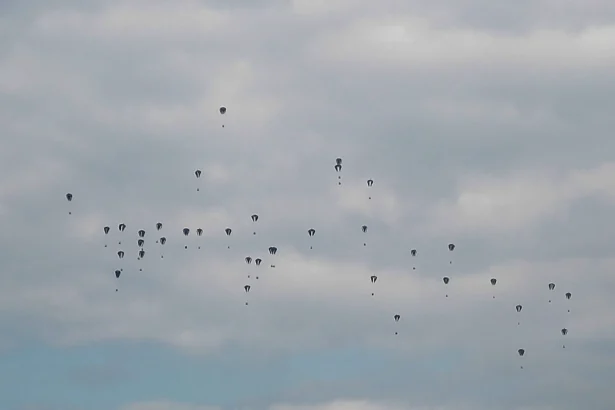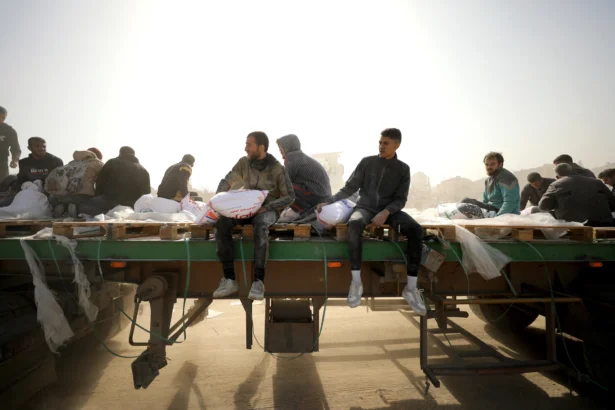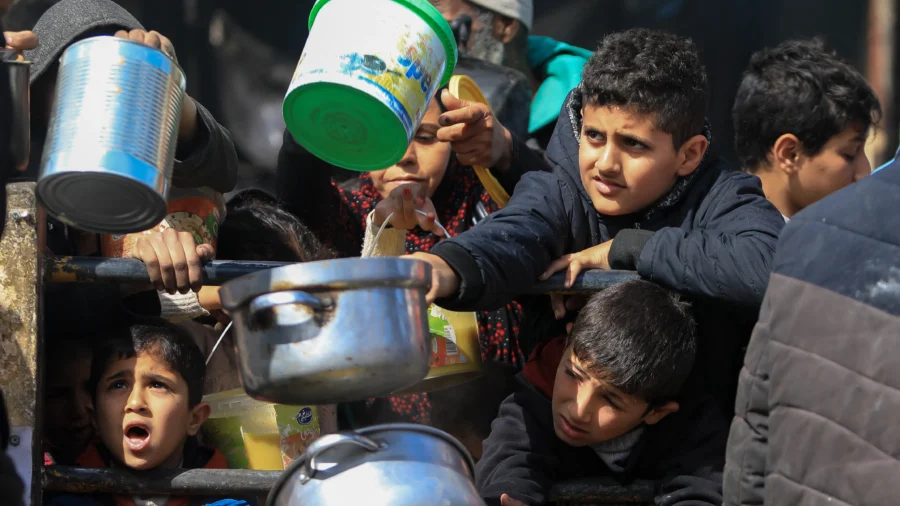A floating pier and causeway that will be used to deliver critical humanitarian aid by sea to Gaza is expected to take at least one month or possibly as long as two for the U.S. military to build and become fully operational, Pentagon press secretary Maj. Gen. Patrick Ryder said on Friday.
Gen. Ryder also said the construction of the pier and causeway will likely require as many as 1,000 U.S. military personnel to complete.
The extended timeline reflects the complicated nature of the project, which is the second such extraordinary measure the Biden administration has announced in just under a week to try to alleviate the desperate humanitarian situation facing Palestinians in Gaza.
The initiative will aim to augment a maritime corridor that the United States, the European Commission, the United Arab Emirates, Cyprus, and the UK, have been working to open to deliver assistance directly.
The U.S. military pier is among a flurry of measures announced by the international community to alleviate the crisis in Gaza, where more than two million people are in need of food and the medical system has all but collapsed.
The plan for the U.S. military to set up a floating dock, announced by President Joe Biden in his State of the Union address on Thursday night, was rolled out just days after the United States began air-dropping meals into Gaza to try to help the population that the United Nations warns is on the brink of famine.

Airdrops ‘A Drop in the Ocean’
But the thousands of meals being dropped at a time by the United States Air Force are not even close to what is needed to feed the over two million Palestinians who remain in the strip. Although the ongoing air drops have provided some relief, they are, in the words of U.N. humanitarian official Sigrid Kaag, “a drop in the ocean.”
The maritime corridor will be used by multiple nations, but the floating pier off the coast of Gaza will be run by the U.S. government and will be constructed by the U.S. military, including Navy and Army personnel.
The pier will allow ships to offload aid, which will then be transported across a causeway into Gaza that will also be constructed by the U.S. military, officials said. The construction will make use of the military’s Joint Logistics Over the Shore capability, which involves the offloading of cargo from ships in areas without a fixed port facility. The United States last deployed this capability in an exercise last year called Talisman Sabre, according to Gen. Ryder.
U.S. military personnel will not transport the aid off of the causeway into Gaza, Gen. Ryder said on Friday, and the causeway will be anchored onto the shore by regional partners on the ground in Gaza. The capability once operational could provide as many as 2 million meals per day for the people of Gaza, Gen. Ryder said.
“We’re in the process of identifying, sourcing, and in some cases, pairing forces to deploy,” Gen. Ryder said. “But I can confirm the elements of the 7th Transportation Brigade Expeditionary Joint Base Langley Eustis in Virginia have been tasked to support.”
The temporary pier concept was developed in part by an organization called Fogbow, according to a person familiar with the planning, which is an advisory group comprised of former military, U.N., and USAID and CIA personnel. The operation is being referred to internally as the Blue Beach Plan, the person familiar with the planning said.
Fogbow is run by former senior American military and intelligence officials. A Qatari official told CNN that they are investing $60 million into the maritime corridor initiative that Fogbow is expected to take an operational lead on, including by transporting the aid from the pier to the beach and handing it over for distribution.
“We are committed to supporting the maritime corridor which is planned by Fogbow,” the official said. “This public-private partnership will bring 200 truckloads of aid via barge from Cyprus to Gaza each day. Qatar has agreed to a significant financial contribution.”
A U.S. official said the United States is in talks with a number of other organizations about helping with the project, but that nothing has been formalized yet.

Immense Challenges
But the challenges are still immense. Because the White House has already ruled out putting American boots on the ground in Gaza, the United States is still trying to determine who will be on the other side of the causeway to receive the aid and distribute it inside the strip, officials said.
“I’m directing the U.S. military to lead an emergency mission to establish a temporary pier in the Mediterranean on the coast of Gaza that can receive large shipments carrying food, water, medicine, and temporary shelters,” President Biden said on Thursday. “No U.S. boots will be on the ground.”
One U.S. official said humanitarian implementers will be at the landing site to take, store, and distribute the aid from the pier. Another person familiar with the planning said the distributors will be local Palestinians under the direction of the U.N.
All ships coming to the floating pier will also need to be screened beforehand for security reasons, officials said.
A pilot program for a maritime corridor that does not require a port, spearheaded by the United Arab Emirates, is expected to start making aid deliveries this weekend, the European Union said on Friday. But the program, which was developed in conjunction with the nonprofit aid organization World Central Kitchen, only involves one smaller amphibious ship.
“This maritime operation remains a quickly evolving and fluid situation,” World Central Kitchen said in a statement, noting that their effort is separate from President Biden’s announcement.
Discussions about opening the maritime corridor ramped up in recent weeks, as it became clear that humanitarian aid was not being let in quickly enough via the few open land crossings into Gaza, officials said.
Administration officials and international aid workers have repeatedly stressed that there must be a “flood” of aid to the people of Gaza and that the most effective way to do so is via overland crossings.
For weeks, increased verbal pressure from the United States failed to push the Israeli government to open additional crossings to aid, even as the humanitarian crisis deepened. In February, as Israeli protests grew at the Kerem Shalom crossing, the number of trucks that were able to pass through the existing crossings plummeted.
On Thursday, a U.S. senior administration official said that “the government of Israel has prepared a new land crossing directly into northern Gaza” but did not say where it would be.
“This third crossing will allow for aid to flow directly to the population in northern Gaza that is in dire need of assistance,” the official said on a call with reporters. “As the U.N. confirmed today, we expect the first deliveries to transit this crossing over the coming weeks, starting with a pilot and then ramping up.”
Ms. Kaag, the U.N. senior humanitarian and reconstruction coordinator for Gaza, stressed that “if everything goes through one crossing or two, we cannot expect miracles, particularly when the situation is very difficult inside Gaza.”
The-CNN-Wire
™ & © 2024 Cable News Network, Inc., a Warner Bros. Discovery Company. All rights reserved.


